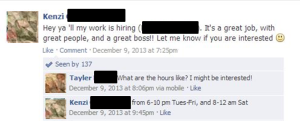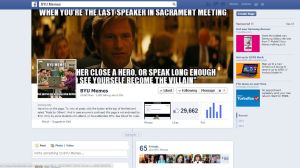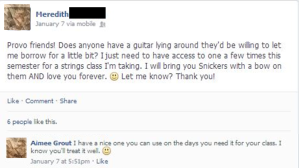I feel pretty socially connected online: I’ve been part of several Facebook groups, I currently have a several hundred friends on face book, I’m part of a family website, I’ve participated in Twitter, Ning, and MiniGroup, I have a Google+ (although I mostly use it just for hangouts), I love Pinterest, and now I’ve got this WordPress blog. I use my social media to reinforce my connections with my “real life” friends.
On the other hand, I have a brother who is adamant against setting up a Facebook profile. I’m working on persuading him, though.
From him, and other people I know without social media profiles, I’ve heard that they don’t want to replace their warm, personal face-to-face relationships with cold, distant online interactions with strangers. They don’t want to be found online, they don’t want people to know their real name, and they would rather watch forums than participate in them.
It seems to be an interesting debate between having a real life and having an online life. I think to live a life in one extreme or the other extreme isn’t very wise. Why not find a middle ground? Why not reinforce real life relationships with online interaction as well? That’s why the reading this week was so interesting. Two scholars from the University of Toronto published an article “Net Surfers Don’t Ride Alone: Virtual Communities as Communities” comparing online communities and real life communities.
In their article, they explored 3 questions for which I will provide real life examples below.
1. ARE ONLINE RELATIONSHIPS NARROWLY SPECIALIZED OR BROADLY SUPPORTIVE?
I think this depends on the type of relationship online, as with all relationships in real life.
Some communities, like camera forums, or specialized for talking about cameras, not broad things like emotional problems. Other broader communities, like ward Facebook pages, are general enough to not only ask about things like church activity times, but also to ask for a favor or invite people over for a movie night.”
As the reading said, “Even close relationships usually provide only a few kinds of social support. Those who provide emotional aid or small services are rarely the same ones who provide large services, companionship or financial aid. ”
Even a more broad but close-knot community, like a ward Facebook page, is not the place to complain about your dating life. However, these online communities are great ways to get to know the people around you better.
2. IN WHAT WAYS ARE THE MANY WEAK TIES ON THE INTERNET USEFUL?
The weak ties can help you with information.
“Virtual communities may resemble ‘real life’ communities in the sense that support is available, often in specialized relationships. However, Net members are distinctive in providing information, support, companionship and a sense of belonging to persons they hardly know off-line or who are total strangers. “
Here’s an example from my ward Facebook page where Kenzi and Tayler, who didn’t know each other very well, were able to exchange information about a job opening at Kenzi’s place of work:
As you can see, the weak ties can help you get a job.
Weak ties also create cultures that can benefit you, such as with humor.
As the reading stated, “Online interaction can also generate a culture of its own, as when humorous stories (or virus warnings) sweep the Net, coming repeatedly to participants. Indeed, the Net is fostering a revival of folk humor. ”
Here’s the BYU Memes page. I don’t know many of the posters on the site, but I love this Facebook page for a good dose of laughter. This is a community full of weak ties, for the culture of BYU and LDS-related humor. (It’s hilarious, and you can check it out here: https://www.facebook.com/BYUMemes)
3. IS THERE RECIPROCITY ON-LINE AND ATTACHMENT IN VIRAL COMMUNITIES?
Once again, the answer to this is both yes and no. As with in real life, it just depends on the type of relationship.
As the reading discussed, it’s easy for people to not want to reciprocate because they are more weakly tied to the people in their viral communities. However, there is an incentive if the do reciprocate. “The process of providing support and information on the Net is a means of expressing one’s identity, particularly if technical expertise or supportive behavior is perceived as an integral part of one’s self-identity. Helping others can increase self-esteem, respect from others, and status attainment.”
The other week a friend needed a guitar. I do not this friend incredibly well, but I’ve been helped out by friends on Facebook before, so I figured I could help her out too.
In the end, I felt good because I helped someone. I didn’t do it for increased self-esteem, but it was a nice benefit to feel good for helping.
Facebook is a great way to help out friends and reinforce relationships in real life. I feel closer to Meredith because I was able to help her out. Someone recently helped me out after giving me a ride home from the airport, and I felt closer to that person in real life because they helped me.
As the reading said, it’s easy to help people when you have a large group. “People know that they may not receive help from the person they helped last week but from another network member.” Nathan helped me. I didn’t help him back, but I helped Meredith. Then Meredith will probably help someone else. The chain keeps on going. People will keep reinforcing relationships as they help people.
Social media doesn’t have to replace real life. It also isn’t evil in and of itself. Social media helps us reinforce our relationships in real-life when we interact online in addition to face-to-face interaction.




I love that you point out that complaining about your dating life would not be approp. on a ward FB page. Way to think about limitations. Are there places online where that WOULD be appropriate?
Maybe if you belonged to Match.com or something…or some kind of online support forum. Hopefully one would have real face-to-face friends to complain to about a personal sort of thing like that, though.
The fact that you felt closer to Meredith (offline?) after helping her out online is critical right? Do social networks lower the cost of producing that feeling of connection?? In what ways does it increase the costs of relationships? Good work Aimee!
That’s right. I think social networks make it easier to have connections with people in real life. I have two coworkers at work who I coordinate with, but I hardly see them because we work different shifts. We’re facebook friends, so when I see the fun stuff they post, it’s easier to have a fun conversation when I do see them about the fun things they did that weekend, etc… Social media enhances real connections. You have to be careful that it doesn’t completely replace face-to-face communication with the people next to you though. That can damage relationships, and in that way can increase the cost of relationships.